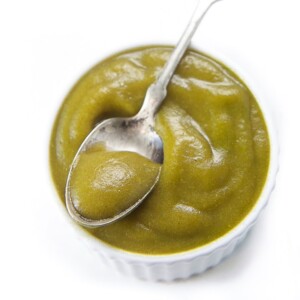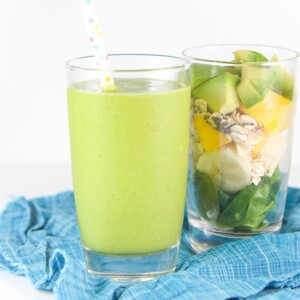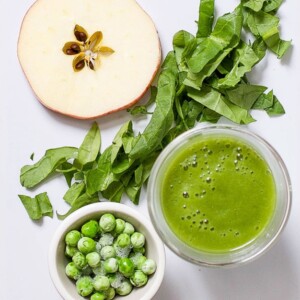Spinach Profile
Medically reviewed and cowritten by Jamie Johnson, Registered Dietitian Nutritionist (RDN).
Spinach Benefits
Spinach is among the world’s healthiest vegetables and ranks very high when compared to other veggies and their nutrient content. This tender, leafy green is rich in vitamins and minerals and is concentrated in phytonutrients that provide our bodies with powerful antioxidant protection. In just one cooked cup of spinach, we are getting 987% of our daily recommended intake (DRI) of vitamin K, and 105% of our DRI of vitamin A! It’s also rich in calcium and a great alternative to animal-based dairy products. In addition to helping our bodies fight oxidative stress, spinach helps protect us from inflammatory problems, cardiovascular disease, bone issues, and certain cancers (especially prostate cancer). Unlike other vegetables containing phytonutrients, researchers have identified more than a dozen different flavonoid compounds in spinach that help keep inflammation and cancer at bay, making it a perfect food to introduce to kids and yourbaby early on. Spinach can be served as a puree for your baby, or steamed or served raw for kiddos. Spinach can be rather stringy once cooked, so serving it blended into a smoothie or puree is probably the safest bet for younger kiddos!
HEALTH BENEFITS OF SPINACH
Thanks to Popeye, we all know spinach is super healthy for us but here are some top health benefits you get:
- high in fiber to help build a healthy heart and aid in digestion
- has a good amount of vitamin C, which is important for skin, eye, immune and brain health
- great source of iron that helps muscles store and use oxygen, and it is vital for brain development
- is an excellent source of vitamin K, which is necessary for blood clotting
- is high in beta-carotene, which converts to vitamin A in the body and is responsible for healthy eyesight
Highlighted Nutritional Importance of Spinach
Vitamins
Vitamin K – spinach contains 987% of our recommended daily intake of Vitamin K! This vitamin is vital for the blood clotting process and a healthy skeletal system
Vitamin A – important for a healthy immune system, skin, eyes and bone health
Folate – this B vitamin supports a healthy brain and nervous system
Vitamin C – helps support baby’s immune system, mucous membranes and respiratory system
Vitamin E – a potent antioxidant that boosts the immune system and helps maintain a healthy blood pressure
Minerals
Manganese – this potent antioxidant helps to form baby’s bones and healthy cartilage and helps protect cells from damage
Magnesium – necessary for the body’s bone and skeletal health and important in regulating energy production within the cell
Potassium – another electrolyte mineral that supports healthy cardiovascular function and kidney function
Iron – this blood-building nutrient enhances the oxygen-carrying capacity of red blood bells
Calcium – regulates bone growth and skeletal development and plays a critical role in hormone production
How to Select and Store Spinach
Spinach is on the Dirty Dozen List, meaning if possible, it’s a good idea to purchase organic to avoid excessive exposure to harmful pesticides.
When purchasing, choose spinach with vibrant, deep green leaves and stems with no signs of yellowing. The leaves should look fresh and tender and be free from wilting, bruising, or a slimy coating. Avoid washing spinach before storing it since the water encourages spoiling. Place the unwashed spinach in a large baggie and squeeze out as much air as possible, then place it in the refrigerator, which will last up to 5 days. Your grocery store may have bagged spinach, a great pre-washed option. Eating frozen spinach is also a convenient option and will yield much more than fresh.
Preparing spinach for your baby is easy. You can steam the spinach or boil it for about 1 minute to create a softer texture and a sweeter taste. After the spinach is cooked, puree with fresh water until it reaches the desired consistency. Pureed spinach can be eaten on its own or added to other sweet or savory purees for a big nutritional boost!







4 Comments on “Spinach Profile”
Is it true there is a fear of nitrates from spinach and it shouldn’t be introduced until 10 months?
Nitrates are a thing, but there hasn’t been a nitrate poisoning in the US since the 50’s when they saw 2 cases in one area that was due to environmental contaminates.
With that being said, everything in moderation. I wouldn’t recommend serving baby 20 ounces of just spinach puree a day. But feel free to serve spinach or carrot (they have nitrates as well) from the very first bite.
So I wouldn’t worry about it.
Let me know if you have any more questions.
xo, Michele
Is it true there is a fear of nitrates from spinach and it shouldn’t be introduced until 10 months?
Nitrates are a thing, but there hasn’t been a nitrate poisoning in the US since the 50’s when they saw 2 cases in one area that was due to environmental contaminates.
With that being said, everything in moderation. I wouldn’t recommend serving baby 20 ounces of just spinach puree a day. But feel free to serve spinach or carrot (they have nitrates as well) from the very first bite.
So I wouldn’t worry about it.
Let me know if you have any more questions.
xo, Michele